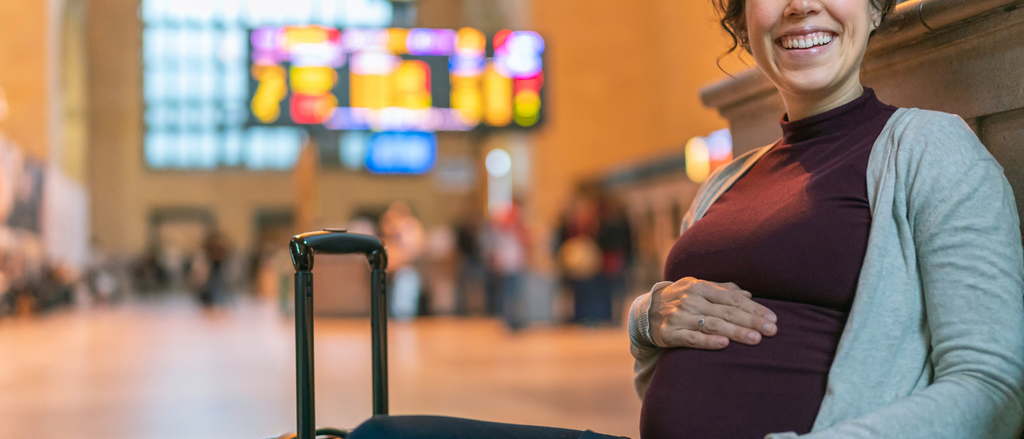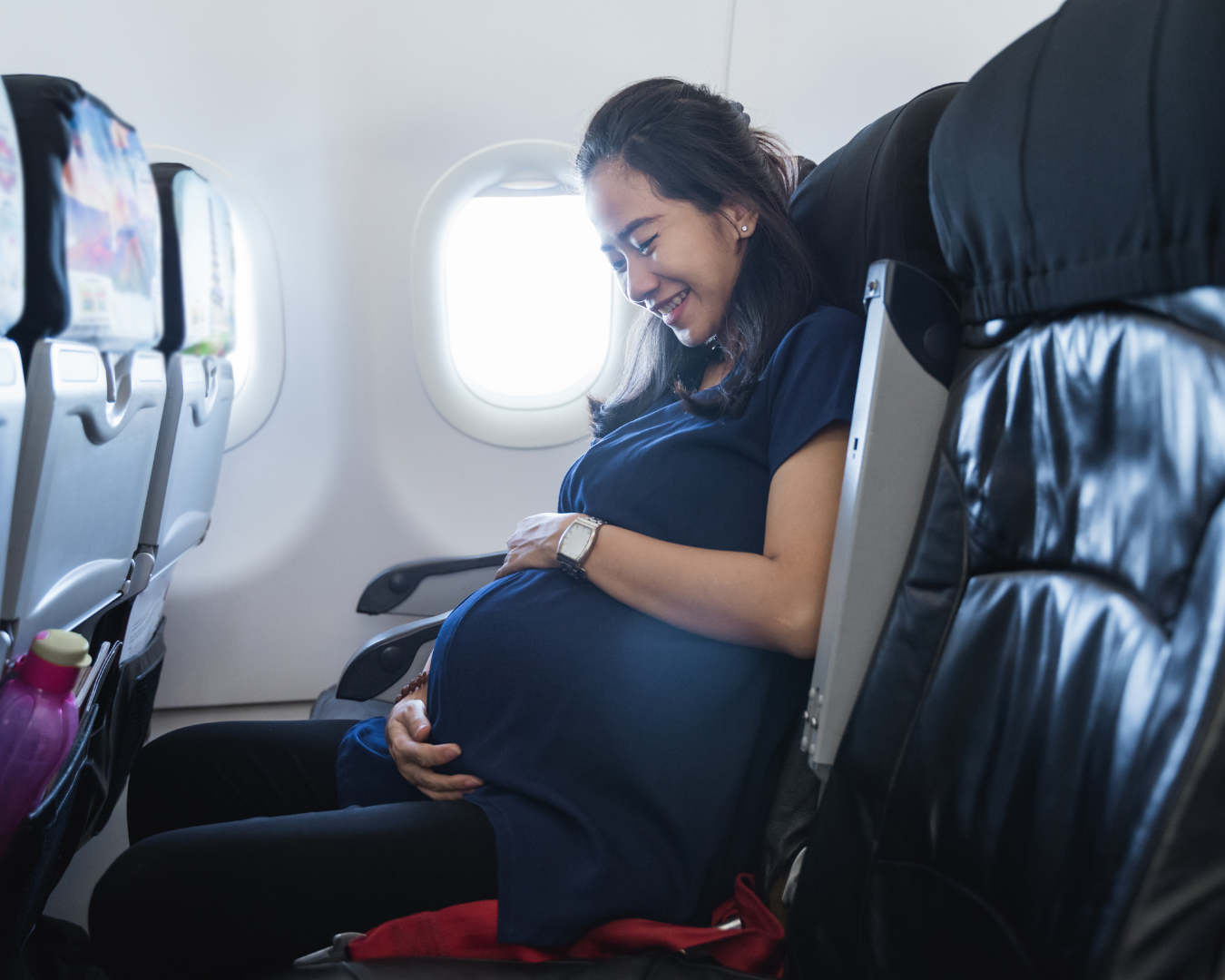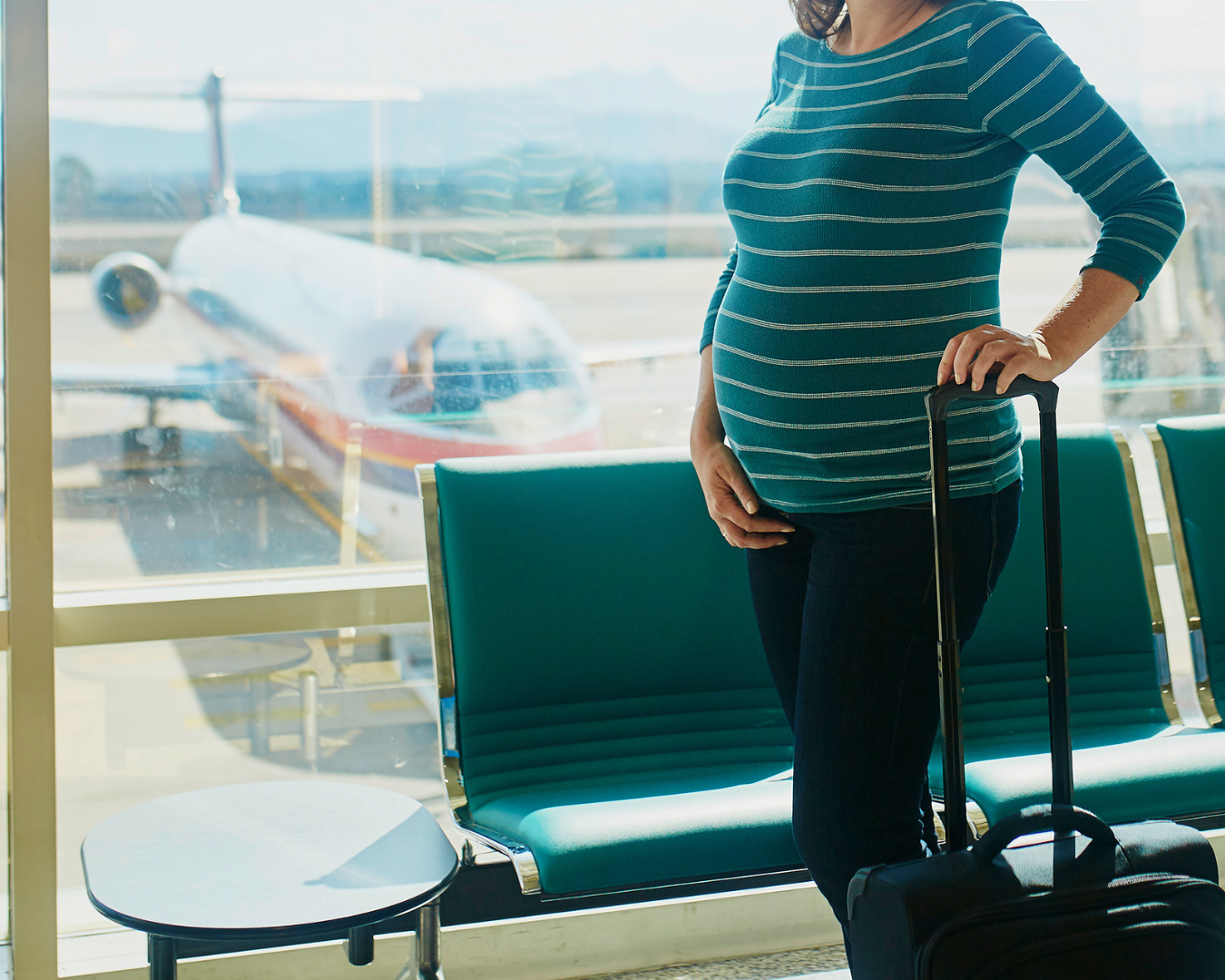
Flying while pregnant: 10 tips for a safe and comfortable trip
Tuesday, May 13, 2025
1. Check with your doctor before flying while pregnant
Do you need medical clearance to fly while pregnant?
Yes, it is recommended and even required by many airlines, such as KLM and British Airways, to get medical clearance from their physicians before boarding if you are travelling while pregnant. The medical clearance document should be signed and stamped by the physician.
What if you’re expecting twins or have a high-risk pregnancy?
Yes, you must get a medical clearance before flying if you’re carrying twins or have a high-risk pregnancy. For example, Finnair requires a medical clearance form at least 72 hours before departure if you have a high-risk pregnancy.
2. Choose the best time in your pregnancy to travel

Is it unsafe to fly while pregnant?
No! Generally, flying while pregnant is safe before 36 weeks of pregnancy for domestic flights. That said, the first trimester and flying may not mix well, as it can be risky. Remember that it’s always best to consult with your physician first — they know what’s best for you!
Can you travel at four months pregnant?
Yes — many women find the best time to travel during pregnancy is between 4 and 6 months, as travelling early pregnancy and flying may cause nausea and vomiting and travelling in the final months of pregnancy can be physically demanding and tiring.
3. Review your airline’s pregnancy policies before booking
Do airline rules vary depending on how far along you are?
Yes, each airline has its own flying limit pregnancy policy. For instance, Ryanair allows travel up to 36 weeks of pregnancy, Easyjet up to 35 weeks, and Wizzair up to 34 weeks. Therefore, it’s important to check the specific airline's policy regarding flying while pregnant.
Do some airlines require a medical certificate after 28 weeks?
Yes — some airlines, such as Wizzair and Ryanair, require a medical certificate signed by a physician confirming you are safe and fit to travel by plane. However, some airlines like Easyjet do not require a medical certificate.
4. Prepare all necessary medical documents for your flight
Is a fit-to-fly certificate required?
Yes, in most cases. As mentioned above, you should check out the specific airline’s website, but most airlines require a fit-to-fly certificate for anyone more than 28 weeks pregnant.
Useful documents to have in case of checks or emergencies
Documents other than fit-to-fly certificates you can carry are a copy of your medical record, which includes your pregnancy information and allows you to get emergency medical attention when needed, and travel insurance, which covers emergency medical care and repatriation.
5. Choose direct flights to minimise stress and fatigue

Does fewer layovers mean fewer delays and less hassle?
Yes! Fewer layovers during travel means there are fewer take-offs and landings, so there is a lower chance of the flight delayed or cancelled than when there are more layovers. It also means less hassle, as you don’t have to navigate through multiple airports after each flight.
Picking a reasonable flight duration: what to consider
It is recommended to take a short-haul flight of less than four hours when you are pregnant to avoid the risk of DVT (Deep Vein Thrombosis). If you are flying over four hours, it’s important to wear loose clothing and take regular walks around the plane.
How to get good sleep on a plane
For sleeping well on a plane when pregnant, you can use travel accessories, such as a neck pillow, a sleep mask, and earplugs. During the night, it’s important to wear compression socks for blood circulation. It’s also a good idea to avoid heavy meals before flying to prevent them from disturbing your circadian rhythm.
6. Pick a seat that offers extra comfort during pregnancy
What are the best airplane seats for pregnant travellers?
It’s the aisle seat! Appropriate seat selection is important for pregnant travellers, as they have to walk around the cabin more often than non-pregnant travellers.
Should I avoid exit row seating if I am pregnant?
Yes — the purpose of the exit row is to have passengers assist crew members during an emergency. This means you must be able to quickly remove obstacles and operate the exit door. Therefore, for safety reasons, the exit row seats are the seats to avoid if you’re flying while pregnant.
7. Wear loose, comfortable clothing for the journey
Breathable fabrics and pregnancy-friendly fits
Breathable fabrics allow air to circulate more freely and keep your body cool when you’re flying while pregnant. It’s a suitable choice of clothing especially during pregnancy where your body undergoes changes, such as increased body heat and swelling.
Helpful accessories: compression socks, lumbar pillows, and more
Compression socks, which are tighter than regular socks, improve blood circulation in the legs by applying controlled pressure. This is particularly useful for pregnant travellers whose legs easily get swollen. Also, lumbar pillows, which support the spine, help to reduce lower back pain.
8. Stay hydrated and avoid heavy meals

Does drinking water before and during the flight matter?
Yes, it does! Cabin air has low humidity levels, so drinking water before and constantly throughout the flight prevents dehydration by compensating for the amount of fluids lost inside your body.
Snacks to help with nausea and bloating
Flying while pregnant may cause nausea. In this case, dry snacks like pretzels with no strong odour, are a good choice to settle your stomach. To avoid bloating, you must eat smaller portions more frequently. Eating fewer foods that cause gas, such as cauliflower and broccoli, helps too.
9. Move around to keep your blood flowing
Simple in-flight exercises to prevent blood clots
First, move your ankles in a circle 10 times in each direction. Second, raise your knee to your chest level and at the same time extend your other leg out as much as possible. Third, remember to take a walk along the aisle once every 30 minutes!
10. Let the cabin crew know if you need any special assistance
When and how to inform the crew you're pregnant
It is recommended to inform the cabin crew about your pregnancy before the flight departure by providing the medical clearance and the expected due date. This way, crew members can be alerted about you flying while pregnant beforehand and assist you better.
How flight attendants can support you during the trip
Flight attendants can give you physical assistance, such as helping you stow the heavy carry-on bags up in the overhead bin. Also, they can provide you with a seatbelt extender if necessary.
What to do if my flight gets delayed or cancelled?
Flying while pregnant can come with its own set of challenges, however, with a little preparation, you can make the journey much more pleasant. And if your flight is delayed or cancelled, adding even more stress to your trip, don't worry! According to the British and EU regulations, you may be entitled to flight compensation up to €600! Claim now using Flight Delayed’s free claim calculator.
We hope you find this information useful, have a safe and amazing trip!
Want to keep up with more interesting tips and travel hacks? Read the rest of our blogs!



Did you like this content ?
Thanks you made our day!
Help us be better!
Well received, thanks!